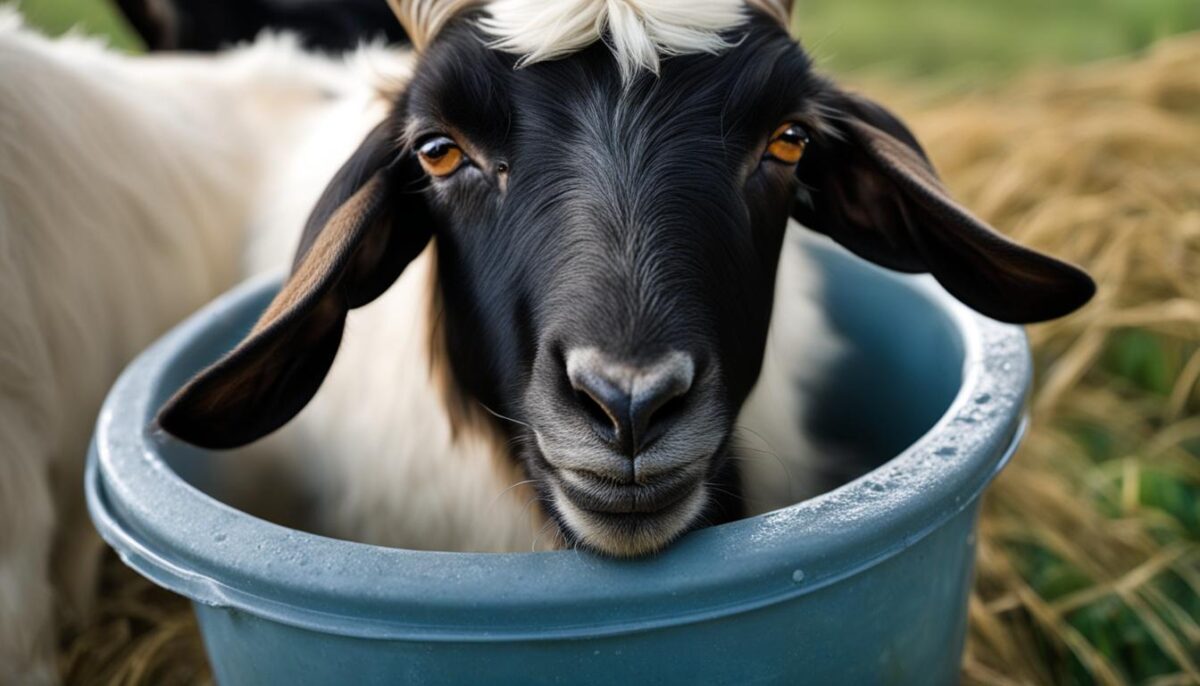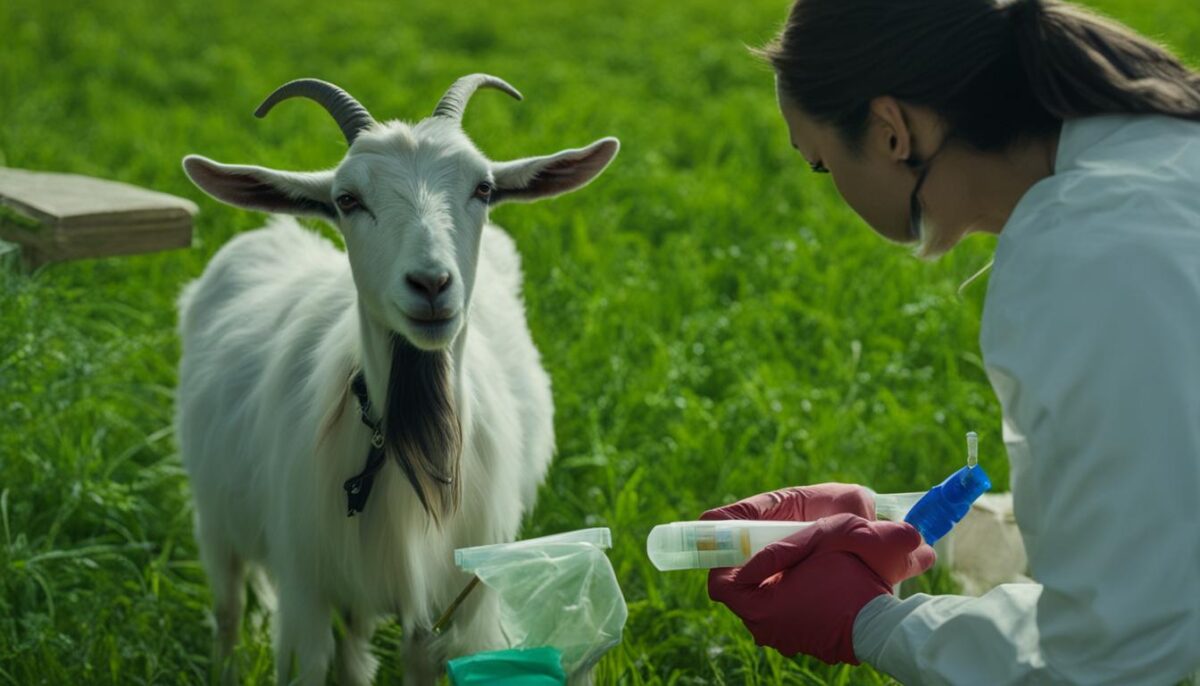Are you concerned about your goat foaming at the mouth? Excessive salivation in goats can be a cause for alarm, but it’s important to understand the underlying reasons behind this phenomenon. Foaming at the mouth in goats can be attributed to various factors, including bloat, poisoning, uneven teeth, and more. In this article, we will delve into the causes, symptoms, and treatment options for foaming in goats, equipping you with the knowledge you need to ensure your goat’s health and well-being.
Key Takeaways:
- Excessive salivation in goats can be caused by bloat, poisoning, or other health issues.
- Recognizing the symptoms and signs of foaming in goats is crucial for effective treatment.
- Proper veterinary care and timely intervention are important for managing goat health issues.
- Prevention measures, such as appropriate diet and pasture management, can help minimize the risk of foaming in goats.
- Regular monitoring of goat health and seeking veterinary advice when needed are vital for their well-being.
Common Causes of Foam in Goats
Foaming in goats can occur due to various factors, leading to concerns about their digestive health. Understanding the underlying causes is essential for proper treatment and preventive measures. Some common causes of foam in goats include:
- Thiamine Deficiency: Thiamine is an essential vitamin for goats, and its deficiency can lead to neurological issues, including foaming at the mouth.
- Tympania: Tympania, also known as bloat, is the accumulation of gas in the rumen. It can result from poor feed quality or improperly formulated rations.
- Dyspepsia: Dyspepsia refers to an upset stomach or indigestion in goats, which can cause excessive salivation and foaming at the mouth.
- Tapeworms: Infestation of tapeworms in goats can lead to foaming, along with other symptoms. Severe cases can result in liver cysticercosis.
Identifying the specific cause of foam in goats is crucial for implementing the appropriate treatment and preventive measures.
“Foaming in goats can be caused by various factors, including thiamine deficiency, tympania, dyspepsia, and tapeworms. Understanding the specific cause is vital for effective treatment and prevention.” – Veterinary Specialist
Table: Comparing Causes of Foam in Goats
| Cause | Symptoms | Treatment |
|---|---|---|
| Thiamine Deficiency | Neurological issues, foaming at the mouth | Administration of thiamine hydrochloric acid |
| Tympania (Bloat) | Abdominal inflation, discomfort, frothy saliva | Oral administration of Tympanol or rumenotomy |
| Dyspepsia | Upset stomach, excessive salivation, foaming | Management of diet and gut health |
| Tapeworms | Foaming, gastrointestinal issues | De-worming medication prescribed by a veterinarian |
By understanding the different causes of foam in goats and their associated symptoms, goat owners and caretakers can take appropriate measures to address these issues and ensure the well-being of their animals.
Symptoms and Signs of Goat Bloat
Goat bloat is a serious condition that can be life-threatening if not recognized and treated promptly. Understanding the symptoms and signs of goat bloat is crucial for early intervention and appropriate treatment. Here are some common indicators to watch out for:
- Lack of appetite: A goat with bloat may exhibit a sudden loss of interest in food.
- Abdominal inflation on the left side: The left side of the goat’s abdomen may appear swollen or distended.
- Pain or tense facial muscles: The goat may show signs of discomfort, with facial muscles appearing tense or painful.
- Grinding teeth: Grinding of teeth can be observed as the goat tries to alleviate the discomfort.
- Kicking the belly: In an attempt to relieve the pressure, the goat may kick or paw at its abdomen.
- Bleating: The goat may vocalize more frequently or exhibit distressing bleating sounds.
- Stamping: The goat may stomp its feet as a sign of discomfort.
- Frequent urination: Bloat can cause increased urination as the distended rumen presses against the bladder.
- Stilted walk: A goat with bloat may have difficulty walking normally, appearing stiff or stilted.
- Difficulty breathing: The pressure from a swollen abdomen can make it harder for the goat to breathe, resulting in rapid or labored breathing.
- Lying down: Bloat can cause the goat to lie down frequently due to discomfort.
Bloat can be categorized into different types, including frothy bloat and free gas bloat. Frothy bloat occurs when goats consume a large amount of rich food that disrupts the balance in the rumen, leading to the production of foamy slime that seals in the gas. Free gas bloat, on the other hand, can occur when there is an obstruction in the throat or esophagus preventing gas from escaping. Recognizing these symptoms and signs of bloat is vital for prompt intervention and appropriate treatment.
Table: Comparison of Frothy Bloat and Free Gas Bloat
| Frothy Bloat | Free Gas Bloat |
|---|---|
| Caused by the consumption of rich food that disrupts rumen balance | Caused by obstruction in the throat or esophagus |
| Foamy slime seals in the gas | Gas is trapped and cannot escape |
| Moderate abdominal distension | Severe abdominal distension |
| Treatment involves introducing a product to break down foam and facilitate gas release | Treatment may require the removal of the obstruction or rumenotomy |
It is important to note that goat bloat can escalate rapidly, leading to severe complications if left untreated. If you suspect that your goat may be experiencing bloat, it is recommended to seek immediate veterinary care for a proper diagnosis and treatment plan.
Treating Goat Bloat
When it comes to treating goat bloat, prompt action is crucial to relieve the goat’s discomfort and prevent further complications. The specific treatment approach will depend on the type and severity of the bloat. Here are some common methods used to address goat bloat:
Stomach Tube:
One widely used method is the use of a stomach tube. This involves passing a tube into the goat’s stomach to release gas and alleviate the bloating. During this procedure, a specialized goat bloat medicine, vegetable or mineral oil, or even dishwashing liquid can be administered through the tube to help break down the foam and facilitate the release of gas.
Veterinary Care:
In severe cases of goat bloat, it is essential to seek veterinary assistance. A veterinarian may perform a trocar puncture of the rumen, which involves inserting a needle-like instrument to release the accumulated gas. This procedure should only be done by a trained professional to avoid any potential complications.
Home Remedies:
In some cases, home remedies can be used as a temporary measure to alleviate goat bloat. These include gentle massaging of the goat’s neck to help release gas or removing any visible blockage in the throat. However, it is important to note that home remedies should not replace proper veterinary care and should only be used as a temporary solution until professional help is available.

Remember, prevention is always better than cure. Implementing proper feeding practices, such as feeding small quantities of concentrates and rich foods gradually, can help minimize the risk of goat bloat. Additionally, proper pasture management, including avoiding excessive legume dominance and providing a wide variety of plants, can also help prevent bloat in goats. Regular monitoring of your goats’ health and prompt veterinary care are essential for ensuring their well-being.
Complications and Prevention of Goat Bloat
Goat bloat can lead to various complications that can negatively affect the health and well-being of your goats. One common complication is acidosis, which occurs when goats consume large quantities of grain too quickly. This leads to rapid bacterial fermentation in the rumen and changes in rumen acidity. Acidosis can have severe consequences, including decreased feed intake, lameness, and even death if left untreated.
Another complication of goat bloat is polioencephalomalacia, a neurological disorder that can result from thiamine deficiency. Thiamine is an essential B vitamin that plays a crucial role in the functioning of the nervous system. When goats experience bloat, it can interfere with thiamine absorption, leading to neurological symptoms such as head pressing, blindness, and seizures.
Enterotoxemia, also known as overeating disease, is another potential complication of goat bloat. This condition occurs when certain bacteria in the gut produce toxins that affect the digestive system. Signs of enterotoxemia may include diarrhea, abdominal pain, fever, and sudden death in severe cases. Lastly, founder, a condition characterized by laminitis or inflammation of the hoof, can develop in goats with chronic bloat. This can lead to severe lameness and discomfort for the animal.
Prevention of goat bloat is key to avoiding these complications. Implementing a suitable goat diet is crucial, with at least 75% of the diet consisting of long-fiber forage such as hay or pasture. Concentrates and rich foods should be fed in small quantities and introduced gradually to prevent overeating. It’s also important to practice proper pasture management to minimize the risk of bloat. This includes providing a wide variety of plants in the pasture and avoiding excessive legume dominance, which can contribute to bloat. Additionally, ensuring that goats do not have access to inedible objects or substances that can cause bloat is essential for prevention.
Table: Possible complications of goat bloat
| Complication | Description |
|---|---|
| Acidosis | Rapid bacterial fermentation in the rumen leads to changes in rumen acidity. Symptoms may include decreased feed intake and lameness. |
| Polioencephalomalacia | Neurological disorder resulting from thiamine deficiency. Symptoms include head pressing, blindness, and seizures. |
| Enterotoxemia | Bacterial toxins affect the digestive system. Signs may include diarrhea, abdominal pain, and sudden death. |
| Founder | Inflammation of the hoof due to chronic bloat, leading to severe lameness and discomfort. |
Treatment for Thiamine Deficiency in Goats
Thiamine deficiency in goats can have severe neurological effects and requires prompt treatment for a favorable prognosis. One common treatment option is thiamine hydrochloric acid, which can be administered to goats intravenously or intramuscularly. The dosage of thiamine hydrochloric acid depends on the weight of the goat, with a recommended range of 200 to 500 mg of the solution. It is important to initiate treatment as soon as possible after the first signs of thiamine deficiency appear to prevent further neurological damage.
Thiamine hydrochloric acid helps to replenish thiamine levels in goats, aiding in the normal functioning of the nervous system. Delivery of the medication through intravenous or intramuscular administration ensures efficient absorption into the bloodstream. Regular monitoring of the goat’s response to treatment is necessary to evaluate the effectiveness of thiamine supplementation and adjust the dosage if needed.
| Treatment for Thiamine Deficiency in Goats | Dosage |
|---|---|
| Thiamine Hydrochloric Acid | 200-500 mg |
“Prompt treatment with thiamine hydrochloric acid is essential to address thiamine deficiency in goats and prevent further neurological complications.”
Managing thiamine deficiency also involves addressing the underlying cause. Inadequate thiamine levels can result from factors such as an imbalanced diet or the consumption of thiaminase-containing plants. Providing a well-balanced diet that meets the nutritional needs of goats, particularly with sufficient thiamine content, is crucial for preventing thiamine deficiency. Additionally, careful evaluation of the goat’s feeding regimen and forage sources can help identify potential thiaminase-rich plants that should be avoided.
Regular veterinary check-ups and consultation are valuable in ensuring the overall health and nutritional adequacy of goats. Seeking professional guidance can help determine the appropriate thiamine dosage, evaluate the goat’s response to treatment, and implement preventive measures to avoid future thiamine deficiency episodes.

Table: Symptoms and Treatment Options for Organophosphate Poisoning in Goats
| Type of Poisoning | Symptoms | Treatment |
|---|---|---|
| Acute Foam | Excessive salivation, muscle tremors, weakness, diarrhea | Administration of atropine, pralidoxime chloride, and diphenhydramine |
| Intermediate Foam | Difficulty breathing, weakness, diarrhea, seizures | Administration of atropine, pralidoxime chloride, and diphenhydramine |
| Delayed Foam | Excessive salivation, muscle tremors, weakness, difficulty breathing, seizures | Administration of atropine, pralidoxime chloride, and diphenhydramine |
Conclusion
Understanding the causes of goat foaming at the mouth, such as bloat, thiamine deficiency, tympania, and organophosphate poisoning, is crucial for the prevention and treatment of these conditions. Goat bloat, one of the common causes of foaming, can be managed through proper feeding practices, pasture management, and prompt veterinary care. Identifying the specific cause of foaming is essential for appropriate treatment, whether it is thiamine deficiency or tympania. Implementing preventative measures and providing a suitable diet can help minimize the risk of goat bloat and its associated complications.
Prompt veterinary care is of utmost importance when it comes to goat health issues. Timely intervention, accurate diagnosis, and appropriate treatment can make a significant difference in the well-being of goats. Regular monitoring of goat health and seeking veterinary advice when needed are vital to ensure their overall health and happiness. Remember, prevention is key, and addressing any concerns promptly can help prevent the development of serious health issues.
In conclusion, understanding the causes, prevention, and treatment of goat foaming at the mouth, particularly goat bloat, is pivotal for goat owners. By applying proper management practices, seeking veterinary care when necessary, and implementing preventative measures, you can ensure the health and vitality of your goats. Remember, the well-being of your goats relies on your proactive approach to their health and the timely care they receive.
FAQ
Why is my goat foaming at the mouth?
Goats may foam at the mouth due to various reasons, including bloat, poisoning, excessive salivation, uneven teeth, and organophosphate poisoning.
What causes bloat in goats?
Bloat is often caused by overeating lush, damp feed such as clover, alfalfa, or legume pastures. It can be classified into different types of foam, including acute foam, intermediate foam, and delayed foam. Leguminous bloat is most common when goats graze on legume or legume-dominant pastures, such as alfalfa or clover.
What are the symptoms of goat bloat?
Symptoms of goat bloat include lack of appetite, discomfort, abdominal inflation on the left side, pain or tense facial muscles, grinding teeth, kicking the belly, bleating, stamping, frequent urination, a stilted walk, difficulty breathing, and possibly lying down.
How can goat bloat be treated?
Treatment for goat bloat depends on the specific type and severity of the condition. It may involve removing any visible blockage in the throat, gently massaging the neck, passing a stomach tube to introduce a product to break down foam, or seeking veterinary assistance for severe cases.
What are the complications of goat bloat?
Goat bloat can lead to complications such as acidosis, polioencephalomalacia, enterotoxemia, and founder.
How can thiamine deficiency in goats be treated?
Thiamine deficiency in goats can be treated with thiamine hydrochloric acid, administered intravenously or intramuscularly.
How can tympania in goats be treated?
Tympania in goats can be treated with the natural remedy “Tympanol,” administered orally through a tube or a rubber bottle. In emergency cases, an emergency rumenotomy may be necessary.
How can organophosphate poisoning in goats be prevented?
Organophosphate poisoning in goats can be prevented by taking appropriate measures to limit exposure to these chemicals. Symptoms of organophosphate poisoning can present in three types: acute foam, intermediate foam, and delayed foam.
How is organophosphate poisoning in goats treated?
Treatment for organophosphate poisoning may involve the administration of atropine, pralidoxime chloride, and diphenhydramine, depending on the type and severity of the poisoning.
What is the importance of prompt veterinary care for goat health issues?
Prompt veterinary care is crucial for the successful management of goat health issues, including bloat and other digestive problems. Regular monitoring of goat health and seeking veterinary advice when needed are vital for ensuring the well-being of your goats.


